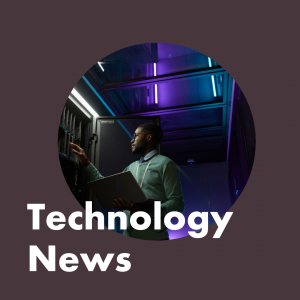Introduction
The world of technology news continues to advance at an astonishing pace, driving innovation and reshaping various industries. From artificial intelligence (AI) and blockchain to virtual reality (VR) and the Internet of Things (IoT), the possibilities seem endless. In this article, we will explore some of the most exciting emerging technologies that are poised to revolutionize the world in the near future.

Quantum Computing: Unleashing Unprecedented Power
Quantum computing holds the promise of solving complex problems that are currently beyond the reach of classical computers. By leveraging the principles of quantum mechanics, these next-generation computers can perform calculations at speeds exponentially faster than traditional machines. With the potential to revolutionize fields such as cryptography, drug discovery, optimization, and weather forecasting, quantum computing is on the verge of transforming our world.
Quantum computers rely on quantum bits, or qubits, which can exist in multiple states simultaneously. This unique property, known as superposition, allows quantum computers to explore a vast number of possibilities simultaneously, exponentially increasing their computing power. Furthermore, the phenomenon of entanglement enables qubits to be linked, allowing for the creation of highly interconnected quantum systems.
Despite the immense potential of quantum computing, there are significant challenges to overcome. Quantum computers are highly sensitive to environmental disturbances and require carefully controlled conditions to maintain the delicate quantum states. Researchers are working on developing error correction techniques and improving qubit stability to ensure the reliability and scalability of quantum computers.
5G Connectivity: The Backbone of a Connected Future
The rollout of 5G networks is set to unleash a new era of connectivity. With faster download and upload speeds, lower latency, and the ability to connect a massive number of devices simultaneously, 5G will be the backbone of the Internet of Things and pave the way for autonomous vehicles, smart cities, and immersive augmented reality experiences. The widespread adoption of 5G will revolutionize industries, enabling seamless communication and unlocking new possibilities for innovation and efficiency.
5G networks operate on higher frequency bands, utilizing millimeter waves, which allow for larger data capacity and faster transmission speeds. This advancement in wireless technology will enable real-time data processing, making it possible for devices to communicate and respond instantaneously. Industries such as healthcare, transportation, manufacturing, and entertainment will greatly benefit from the increased reliability and speed of 5G networks.

Augmented Reality (AR) and Virtual Reality (VR): Shaping Immersive Experiences
AR and VR technology news are blurring the boundaries between the physical and virtual worlds, transforming how we interact with information and entertainment. Augmented reality overlays digital content onto the real world, enhancing our perception and providing valuable contextual information. Virtual reality, on the other hand, immerses users in entirely virtual environments, creating new opportunities for gaming, education, training, and virtual tourism. The increasing adoption of AR and VR will undoubtedly reshape various sectors, including healthcare, architecture, retail, manufacturing, and entertainment, and will pave the way for new forms of storytelling and human-computer interaction.
VR, on the other hand, has seen significant advancements in gaming and entertainment. With the availability of high-resolution displays and immersive audio, VR gaming has become more captivating and realistic. Beyond gaming, VR is being used for training simulations in various industries, such as aviation and healthcare, allowing professionals to practice in virtual environments that mimic real-world scenarios.
Edge Computing: Empowering Real-Time Processing
Edge computing brings computation and data storage closer to the devices and sensors generating the data, reducing latency and enhancing real-time processing capabilities. By processing data locally instead of relying solely on the cloud, edge computing enables faster decision-making and supports critical applications that require minimal latency, such as autonomous vehicles, industrial automation, and remote healthcare. The proliferation of edge computing will revolutionize how data is managed, opening up possibilities for innovative services and applications.
Technology news encompasses the latest updates, breakthroughs, and trends in the world of technology. It covers a wide range of topics, including advancements in artificial intelligence, blockchain, cybersecurity, robotics, internet of things, and more. Technology news keeps readers informed about cutting-edge innovations, new product releases, industry developments, and the impact of technology on various sectors. It serves as a vital resource for professionals, enthusiasts, and anyone interested in staying abreast of the fast-paced and ever-evolving world of technology. Whether it’s highlighting groundbreaking discoveries or providing insights into the future of tech, technology news plays a crucial role in shaping our understanding of the digital world and its potential to transform society.
Conclusion
The rapid pace of technological advancement continues to drive the transformation of our world. From quantum computing and 5G connectivity to augmented and virtual reality, edge computing, and biotechnology, these emerging technologies are poised to reshape industries, enhance human experiences, and solve complex problems. As we embark on this exciting journey into the future, it is essential to embrace these technologies responsibly, ensuring that they serve humanity’s best interests and contribute to a more inclusive and sustainable world.





